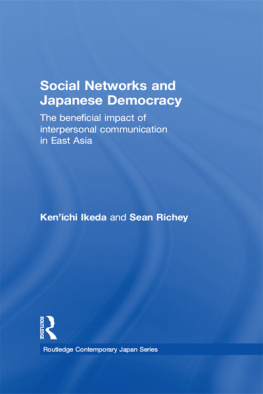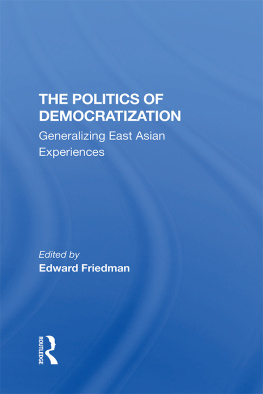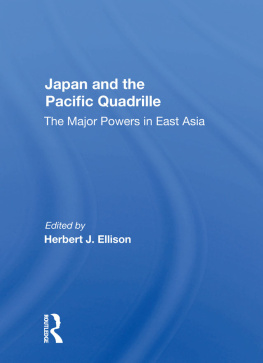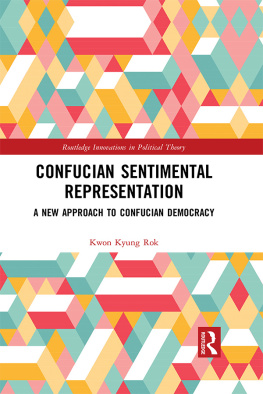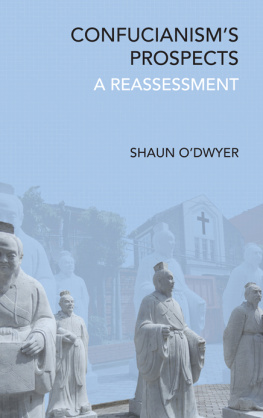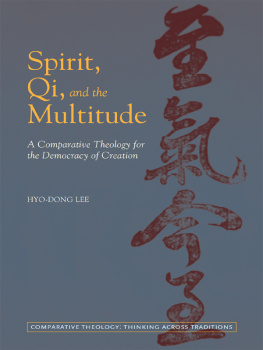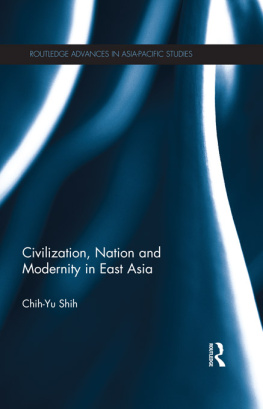Social Networks and
Japanese Democracy
Many who critique democracy as practiced in East Asia suggest that the Confucian political culture of these nations prevents democracy from being the robust participatory type, and limits it to a spectacle designed to create obedience from the public. Certainly some East Asian nations have had elections for decades, but for democracy to be meaningful, a country needs an active public sphere, political tolerance, egalitarian beliefs, and vigorous political participation. The Asian-values debate focuses on whether the creation of this optimal version of democracy in East Asian nations will be hindered by their shared Confucian cultural heritage and at the center of this debate is whether there is an active political culture in East Asia that allows citizens to discuss, debate, and disagree about politics freely.
With Japan as its focus, this book examines the role of social networks and political discussion in Japanese political culture and asks whether discursive participatory democracy is indeed possible in East Asia. In order to answer this question the authors undertook the largest academic political survey ever conducted in Japan to give the book exceptional empirical credence. This data reveals how the Japanese people interact politically, concluding that, through the powerful influence of social networks on Japanese political behavior, Japan has a more globalized and less hierarchical society where Confucian culture is not dominant and where creation of a vibrant civil society is possible.
This book will be invaluable for students and scholars of Japanese politics, democracy, civil society, and globalization.
Ken'ichi Ikeda is a professor in the Department of Social Psychology at the University of Tokyo, Japan.
Sean Richey is an assistant professor of Political Science in the Department of Political Science at Georgia State University in Atlanta, USA.
Routledge Contemporary Japan Series
A Japanese Company in Crisis
Ideology, strategy, and narrative
Fiona Graham
Japan's Foreign Aid
Old continuities and new directions
Edited by David Arase
Japanese Apologies for World War II
A rhetorical study
Jane W. Yamazaki
Linguistic Stereotyping and Minority Groups in Japan
Nanette Gottlieb
Shinkansen
From bullet train to symbol of modern Japan
Christopher P. Hood
Small Firms and Innovation Policy in Japan
Edited by Cornelia Storz
Cities, Autonomy and Decentralization in Japan
Edited by Carola Hein and Philippe Pelletier
The Changing Japanese Family
Edited by Marcus Rebick and Ayumi Takenaka
Adoption in Japan
Comparing policies for children in need
Peter Hayes and Toshie Habu
The Ethics of Aesthetics in Japanese Cinema and Literature
Polygraphic desire
Nina Cornyetz
Institutional and Technological Change in Japan's Economy
Past and present
Edited by Janet Hunter and Cornelia Storz
Political Reform in Japan
Leadership looming large
Alisa Gaunder
Civil Society and the Internet in Japan
Isa Ducke
Japan's Contested War Memories
The memory rifts in historical consciousness of World War II
Philip A. Seaton
Japanese Love Hotels
A cultural history
Sarah Chaplin
Population Decline and Ageing in Japan The Social Consequences
Florian Coulmas
Zainichi Korean Identity and Ethnicity
David Chapman
A Japanese Joint Venture in the Pacific
Foreign bodies in tinned tuna
Kate Barclay
JapaneseRussian Relations, 19072007
Joseph P. Ferguson
War Memory, Nationalism and Education in Post-War Japan,
19452007
The Japanese history textbook controversy and Ienaga Saburo's court Challenges
Yoshiko Nozaki
A New Japan for the Twenty-First Century
An inside overview of current fundamental changes and problems
Edited by Rien T. Segers
A Life Adrift
Soeda Azembo, popular song and modern mass culture in Japan
Translated by Michael Lewis
The Novels of Oe Kenzaburo
Yasuko Claremont
Perversion in Modern Japan
Psychoanalysis, literature, culture
Edited by Nina Cornyetz and J. Keith Vincent
Homosexuality and Manliness in Postwar Japan
Jonathan D. Mackintosh
Marriage in Contemporary Japan
Yoko Tokuhiro
Japanese Aid and the Construction of Global Development
Inescapable solutions
Edited by David Leheny and Carol Warren
The Rise of Japanese NGOs
Activism from above
Kim D. Reimann
Postwar History Education in Japan and the Germanys
Guilty lessons
Julian Dierkes
Japan-Bashing
Anti-Japanism since the 1980s
Narelle Morris
Legacies of the Asia-Pacific War
The Yakeato generation
Edited by Roman Rosenbaum and Yasuko Claremont
Challenges of Human Resource Management in Japan
Edited by Ralf Bebenroth and Toshihiro Kanai
Translation in Modern Japan
Edited by Indra Levy
Language Life in Japan
Transformations and prospects
Edited by Patrick Heinrich and Christian Galan
The Quest for Japan's New Constitution
An analysis of visions and constitutional reform proposals 19802009?
Christian G. Winkler
Japan in the Age of Globalization
Edited by Carin Holroyd and Ken Coates
Social Networks and Japanese Democracy
The beneficial impact of interpersonal communication in East Asia
Ken'ichi Ikeda and Sean Richey
First published 2012
by Routledge
2 Park Square, Milton Park, Abingdon, Oxon OX14 4RN
Simultaneously published in the USA and Canada
by Routledge
711 Third Avenue, New York, NY10017
Routledge is an imprint of the Taylor & Francis Group, an informa business
2012 Ken'ichi Ikeda and Sean Richey
The right of Ken'ichi Ikeda and Sean Richey to be identified as authors of this
work has been asserted by them in accordance with the Copyright, Designs
and Patents Act 1988.
All rights reserved. No part of this book may be reprinted or reproduced or
utilized in any form or by any electronic, mechanical, or other means, now
known or hereafter invented, including photocopying and recording, or in any
information storage or retrieval system, without permission in writing from
the publishers.
Trademark notice: Product or corporate names may be trademarks or
registered trademarks, and are used only for identification and explanation
without intent to infringe.
British Library Cataloguing in Publication Data
A catalogue record for this book is available from the British Library
Library of Congress Cataloging in Publication Data
Ikeda, Ken'ichi, 1955
Social networks and Japanese democracy : the beneficial impact of

